The Association of State and Provincial Psychology Boards (ASPPB) has repeatedly explained that its mission is to support licensing boards in meeting their goal of public protection. With this in mind, on March 21, 2016, the ASPPB announced its intention to create a competency exam, the Examination for Professional Practice of Psychology Step 2 (EPPP2), which the ASPPB expects to be ready for implementation by January of 2019. Unlike the EPPP, which is intended to assess knowledge, the EPPP2 is intended to assess competency-based skills. While public protection is an admirable goal, and one which I believe the ASPPB is sincerely committed to, it’s unclear how this additional test would help licensing boards meet their goal of public protection. The EPPP itself has been subject to many critiques that remain unanswered, critiques that would likely apply to the EPPP2 as well. Due to the significant investments of time and money students will be required to make in taking the EPPP2 (the cost of the EPPP is $687 in most jurisdictions, and half of test takers spend over 200 hours preparing), these critiques should be addressed prior to the implementation of the EPPP2.
Author Archives: Luciano Lima
#NotMyPresident – Anti-Racism Activism Under a Trump Presidency
Open Letter to Graduate Students in Psychology:
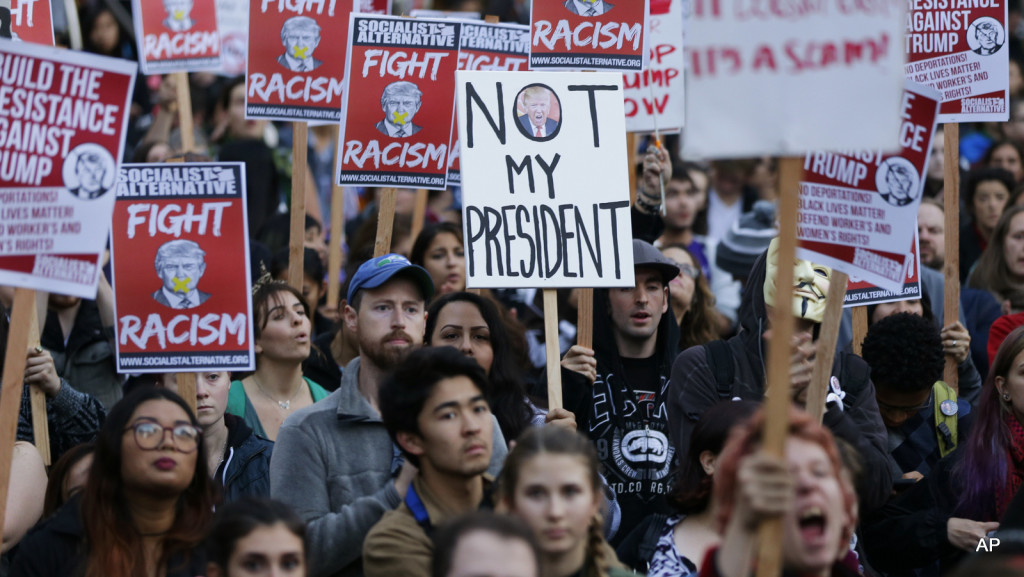
Protesters hold signs during a protest against the election of President-elect Donald Trump, Wednesday, Nov. 9, 2016, in downtown Seattle. (AP Photo/Ted S. Warren)
On November 9, 2016, we woke up to a new era in modern American politics. Not since the presidential campaign of pro-segregation proponent George Wallace in 1968 have racial and ethnic intolerance been expressed so openly and vehemently by a presidential candidate. Donald Trump called Mexican immigrants “rapists” and “drug dealers,” questioned the impartiality of federal judge Gonzalo Curiel due to his Mexican ancestry, and called for a ban on Muslims entering the United States. He also proclaimed that African-Americans and Latinos are “living in hell,” reinforcing negative stereotypes and ignoring the vibrancy that exists in both communities. Indeed, Donald Trump has a long history of racist remarks and attitudes. Trump also repeatedly made misogynistic statements that denigrated and demeaned women, and was caught boasting about sexual assault. Despite these infractions, Donald Trump became the President-Elect of the United States.
The work of activists is needed now more than ever. As is evident from the recent wave of hate crimes across the United States, bigots are emboldened as a result of Trump’s victory, and Black and Brown lives are at great risk. The APA Ethics Code calls on us to promote the welfare and protection of the individuals and groups with whom psychologists work. The code also calls on psychologists to “respect and protect the civil and human rights” of our clients. When the welfare of our clients is jeopardized by racial discrimination, we are called to stand up and seek justice on their behalf.
With this in mind, we are calling for a national dialogue titled “#NotMyPresident – Anti-Racism Activism Under a Trump Presidency,” to take place at 5:00 p.m. CST on January 17, 2017.
How Much Do Black Lives Matter to the APA?
 As a student member of the APA and a psychologist in training, I’ve been disappointed in the American Psychological Association’s (APA) public response to the deaths of African American’s at the hands of police officers as well as mass shooters. While I’ve appreciated APA’s vigorous response to the Orlando tragedy, I couldn’t help but compare it to the APA’s response to the Charleston shootings. When I looked back to see if the APA offered services to the families of the victims of the Charleston shootings, or any other resources, I couldn’t find anything, not even a public statement condemning the shootings. Granted, the Charleston shooting occurred only a few weeks before the release of the Hoffman Report. Yet preoccupation with the Hoffman Report does not explain APA’s silence, as it issued four press releases between the day of the Charleston shooting and the release of the Hoffman Report.
As a student member of the APA and a psychologist in training, I’ve been disappointed in the American Psychological Association’s (APA) public response to the deaths of African American’s at the hands of police officers as well as mass shooters. While I’ve appreciated APA’s vigorous response to the Orlando tragedy, I couldn’t help but compare it to the APA’s response to the Charleston shootings. When I looked back to see if the APA offered services to the families of the victims of the Charleston shootings, or any other resources, I couldn’t find anything, not even a public statement condemning the shootings. Granted, the Charleston shooting occurred only a few weeks before the release of the Hoffman Report. Yet preoccupation with the Hoffman Report does not explain APA’s silence, as it issued four press releases between the day of the Charleston shooting and the release of the Hoffman Report.
Moreover, the APA’s virtual silence in response to the numerous police shootings of unarmed African American men, women, and children is dumbfounding. In an op-ed in response to Ferguson, written by former APA President Nadine Kaslow and former APA CEO Norman Anderson, the authors fall short of condemning the shooting of an unarmed black teenager and state, “[t]he judicial system will determine exactly what transpired between Michael Brown and the police officer.” Considering the historical treatment of African Americans by the judicial system, and the continued shocking disparities, their faith in the ability of the system to determine what transpired and provide a just outcome was questionable at best. Perhaps Kaslow and Anderson’s questionable faith is representative of the APA’s position overall, and explains the silence.

National Die-In Recap
Fellow Advocates for Social Justice,
First, I want to apologize for the interval between the National Die-In and this post. I had two weeks of finals immediately after our Die-In and was focused on that. It is the challenge of being both a student and an advocate for social justice, something I know may of you are familiar with. I also needed some time and distance to reflect on what was a very powerful experience.

That said, the National Die-In was a great success! Our event in Chicago had approximately 50 participants, mostly students and faculty from schools throughout the Chicago region, who attended despite frigid temperatures and snow. The fact that so many attended despite the weather was inspiring. We lay on the pavement in front of City Hall for 16 minutes, representing the 16 bullets shot at Laquan McDonald, while a student read 16 key points from the APA’s Resolution Against Racism and Racial Discrimination. Folks who just happened to be walking by lay down next to us on the cold pavement in support of our cause. One of these individuals, a high school senior, even helped us carry signs back to the school afterward. Others were not as supportive, with one passerby expressing his opinion that we should leave the United States and form our own country. We were also filmed by two local news crews, and I hope to be able to retrieve the footage so that we can share it on social media. Please check out pictures from the Chicago Die-In on our Facebook event page.
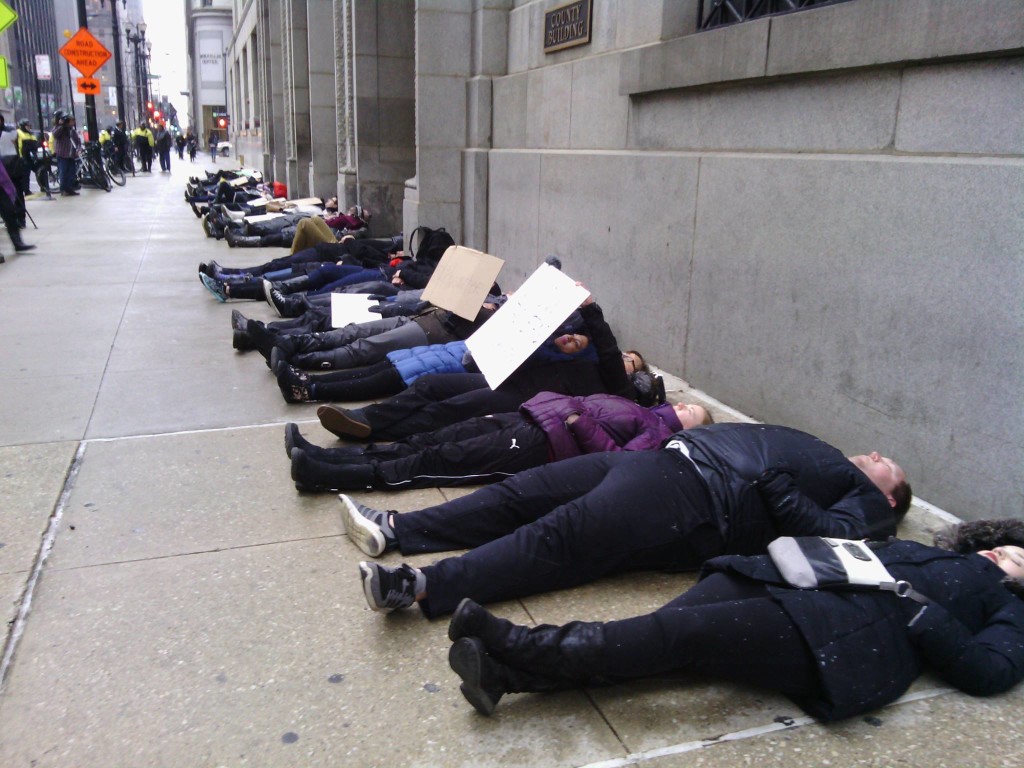
Students participating in the Die-In in front of City Hall in Chicago.
 This has been an inspiring journey for me and I thank you all for your collective efforts in making this happen. We staged a coordinated event at 20 schools, across 12 states, with hundreds of student and faculty participants. You should all be proud of your efforts! Of course, this is just the first step in the #psychologists4blacklives movement and I hope that together we can keep the momentum going. We are planning to be at the APA Convention in August. An even bigger event next year would be awesome. There are so many possibilities. We just need to connect those willing and able to do the hard work that it takes to stage events, with those with the courage to attend them.
This has been an inspiring journey for me and I thank you all for your collective efforts in making this happen. We staged a coordinated event at 20 schools, across 12 states, with hundreds of student and faculty participants. You should all be proud of your efforts! Of course, this is just the first step in the #psychologists4blacklives movement and I hope that together we can keep the momentum going. We are planning to be at the APA Convention in August. An even bigger event next year would be awesome. There are so many possibilities. We just need to connect those willing and able to do the hard work that it takes to stage events, with those with the courage to attend them.
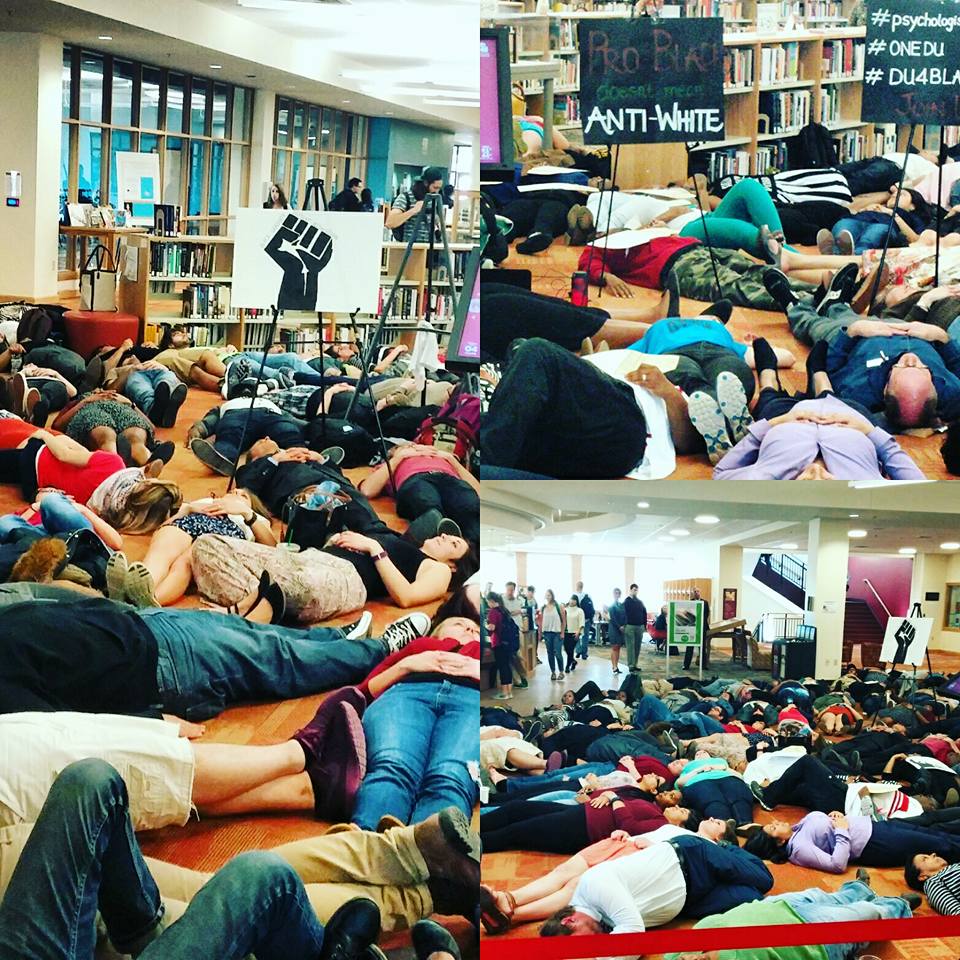
Students at University of Denver, participating in the Die-In in their school library.
 Schools throughout the country uploaded their pictures as well! Die-In participants at Virginia Commonwealth University, Boston College, University of Denver, and the University of North Texas also uploaded their pictures, and these schools were joined by Auburn University with multiple tweets about their Die-Ins. I also received pictures from the University of Oregon’s Die-In. I thought we had it rough with the weather but compared to Boston College we had it easy. The BC Die-In took place on what looked to be at least 6 inches of snow. Thank you so much for those who have already used social media to disseminate news about their events. For those of you who haven’t yet, please upload your pictures to our Facebook event page, Twitter, and any other sites that you use so that we can get maximum exposure for our #psychologists4blacklives Die-Ins. Also, please share this information with your school and local news sources.
Schools throughout the country uploaded their pictures as well! Die-In participants at Virginia Commonwealth University, Boston College, University of Denver, and the University of North Texas also uploaded their pictures, and these schools were joined by Auburn University with multiple tweets about their Die-Ins. I also received pictures from the University of Oregon’s Die-In. I thought we had it rough with the weather but compared to Boston College we had it easy. The BC Die-In took place on what looked to be at least 6 inches of snow. Thank you so much for those who have already used social media to disseminate news about their events. For those of you who haven’t yet, please upload your pictures to our Facebook event page, Twitter, and any other sites that you use so that we can get maximum exposure for our #psychologists4blacklives Die-Ins. Also, please share this information with your school and local news sources.
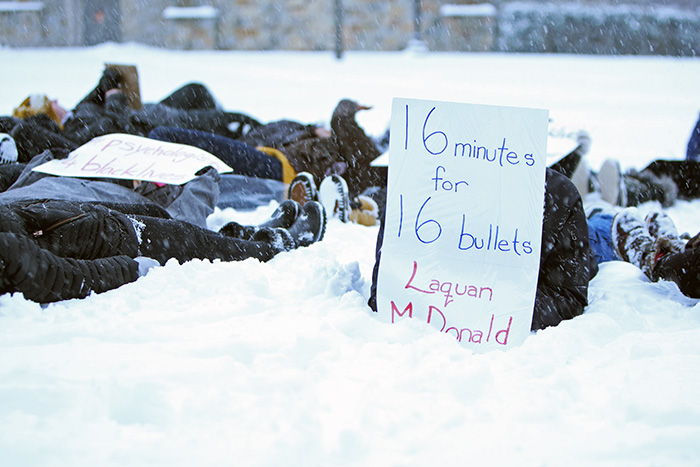
Students at Boston College, braving the snow to support the Die-In.
 Participating Schools:
Participating Schools:
- Illinois School of Profession Psychology at Argosy, Chicago
- Pritzker School of Medicine, University of Chicago
- University of North Texas
- The Chicago School of Professional Psychology, Chicago Campus
- The Chicago School of Professional Psychology, Washington, DC Campus
- Chicago Art Institute
- University of Illinois School of Social Work
- Adler University
- Boston College
- Auburn University
- Adelphi University
- Howard University
- Roosevelt University
- University of New Haven
- The New School for Social Research
- Georgetown University
- University of Denver
- University of Hartford
- University of Oregon
- National Louis University
In Solidarity,
Luciano
#psychologists4blacklives

National Graduate Student in Psychology Die-In on April 4
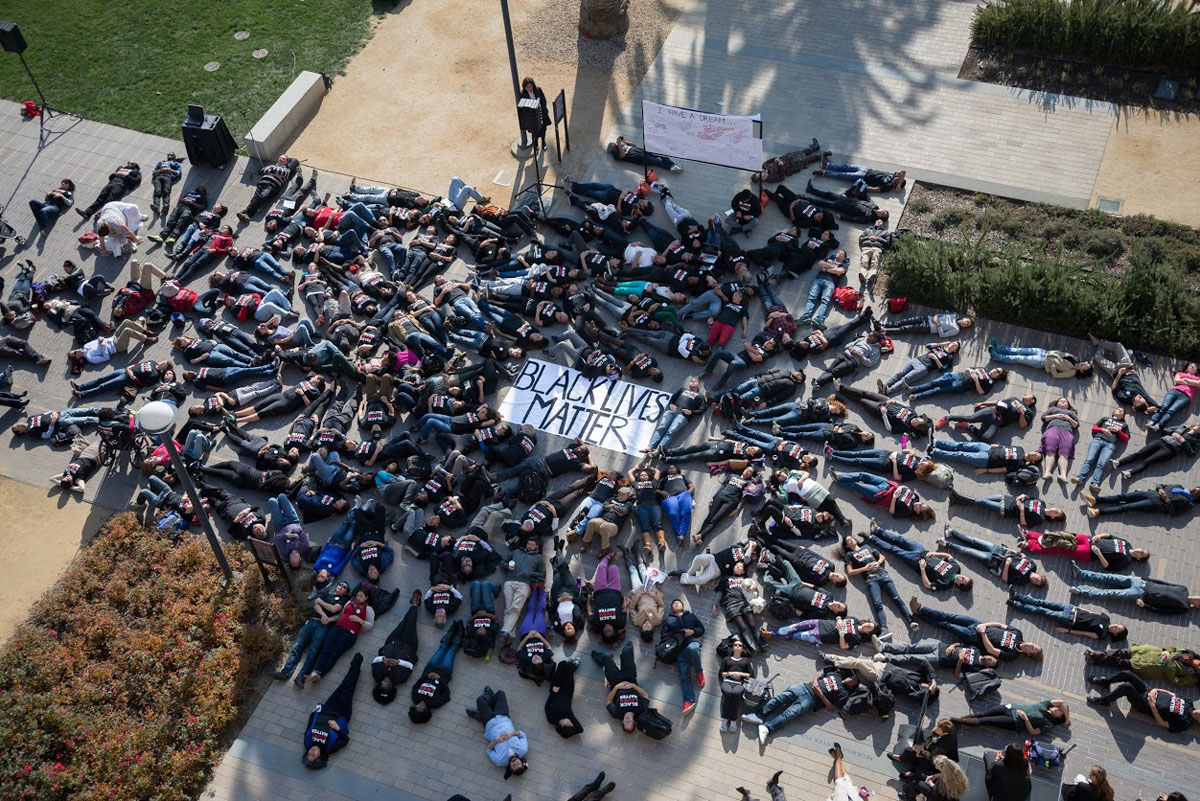
Med students at a #blacklivesmatter die-in at Stanford University. There is a planned die-in across the country on April 4. (Image source: David Purger, PhD, Stanford University. Used with permission.)
Editor’s Note: This post is submitted by Luciano Lima, a doctoral student at the Illinois School of Professional Psychology at Argosy University, in Chicago, Illinois. APAGS does not have an official position on this event, and takes no responsibility for any actions that may result from one’s independent decision to participate.
Open Letter to Graduate Students in Psychology
Over the past few years this country has experienced an upwelling of racial strife resulting from the deaths of numerous black men, boys, and women at the hands of police officers. In response, medical students throughout the country staged a coordinated nationwide Die-In protest against racial bias and violence, which included over 90 medical schools and thousands of students. I observed their activities with admiration and thought to myself, “Why can’t we do that? The reasons provided by the medical students for their protest are just as applicable to graduate students in psychology:
“Racial bias and violence are not exclusively a problem of the criminal justice system. As we have seen in Ferguson, Mo., New York, and countless other places, bias kills, sickens, and results in inadequate healthcare. As medical students, we must take a stand against the oppression of our black and brown patients, colleagues, friends, and family. By standing together at medical schools nationwide, we hope to demonstrate that the medical student community views racial violence as a public health crisis. We are#whitecoats4blacklives.”
Racial bias causes damage not only to the physical, but also the mental health of our clients. We are intimate witnesses to the psychological harm that results from police violence and racial profiling—from the teenager who is unjustly stopped and searched on a routine basis merely for possessing the wrong skin color, to the families, loved ones, and communities traumatized by senseless killings.
In the APA Ethics Code, a guiding principle of our profession is promoting the welfare and protection of the individuals and groups with whom psychologists work. The code also calls on psychologists to “respect and protect the civil and human rights” of our clients. When the welfare of our clients is jeopardized by racial discrimination, we are called to stand up and seek justice on their behalf. Towards this end, we are calling for a coordinated nationwide Die-In demonstration of graduate psychology students and others who are passionate about this cause.
The nationwide Die-In of graduate psychology students will be on Monday, April 4, 2016, the anniversary of the assassination of Martin Luther King, Jr.
We call on fellow students to take up the torch and organize Die-ins on their respective campuses. The Chicago branch of the Die-in will be meeting at Daley Plaza (50 W Washington St, Chicago, IL 60602) at exactly 5 p.m., central time. We will lay together in silence for 16 minutes, each minute representing one of the bullets fired into Laquan McDonald. Please bring signs and dress for the weather!
We have created a Facebook event page to help coordinate our activities.
We call on student leaders to spread the word throughout their programs, so that we can make a powerful statement of our values and vision for the future. Also, please share this letter on social media and email your friends and colleagues to help get the word out.
Your Fellow Students,
#psychologists4blacklives
For additional questions please contact Luciano Lima and Keisha-Marie Alridge.
